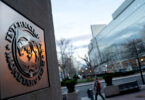BANGKOK (AP): The Bank of Japan’s quarterly survey on business sentiment shows large Japanese manufacturers have grown more optimistic in the past several months, the third straight quarter of improvement even while other data showed the economy in a contraction.
The central bank’s “tankan” survey, released Wednesday, measured business sentiment among major manufacturers at plus 12, up from plus 9 in October and plus 5 in June.
The tankan survey, conducted every three months, measures corporate sentiment by subtracting the number of companies saying business conditions are negative from those replying they are positive. It’s considered a leading indicator of future trends in the world’s third-largest economy.
The survey showed sentiment among major non-manufacturers rose 3 points to plus 30 from plus 27 in the previous survey. It was the seventh consecutive quarter of improvement and the most positive result in about three decades.
A recovery of foreign tourism and a resurgence of business activity and domestic travel after the bleak days of the pandemic have contributed to a rebound in retail and leisure activities.
However, high borrowing costs in the U.S. and other major markets have crimped demand for Japanese exports, dragging on growth.
Updated data released on Friday showed Japan’s economy shrank by 2.9% year-on-year in the July-September quarter, worse than estimated earlier.
“The continued improvement in the ‘tankan’ suggests that the drop in Q3 GDP was just a blip, but we still expect GDP growth to slow sharply next year,” Marcel Thieliant of Capital Economics said in a note to clients.
The tankan’s projection of business sentiment three months from now among large manufacturers showed they expect conditions to deteriorate, falling 4 points to plus 8. Non-manufacturers also were pessimistic, with the forecast falling 6 points to plus 24.
The Bank of Japan’s stance on its monetary policy is keenly watched, with many market observers increasingly expecting it will shift away from its longstanding negative interest rate policy in coming months.
No major moves are expected at a policy meeting that will wrap up on Dec. 19. Recent price data suggest an easing of inflationary pressures and that could leave the central bank less likely to change gears and raise interest rates out of concern that the economy may slow further.







